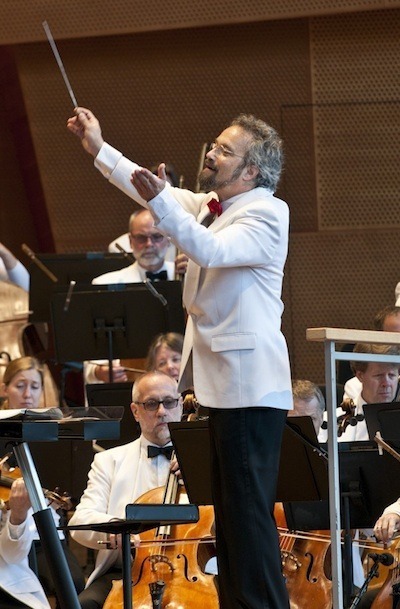Kalmar, Grant Park Orchestra deliver stirring and eloquent Elgar

Over eight decades, there are not many works that have been left unperformed at the Grant Park Music Festival, not least symphonies from the Late Romantic era.
Leave it to the indefatigable Carlos Kalmar to plug in the few remaining repertory gaps. On Friday night, the festival’s principal conductor led the Grant Park premiere of Sir Edward Elgar’s Symphony No. 1.
Nearly every person in this country has been handed a diploma with the trio section of Elgar’s Pomp and Circumstance March No. 1 playing in the background. Yet the English composer’s concert music still only fitfully makes it onto American symphony programs. While his autumnal Cello Concerto remains his best-known piece, Elgar’s two completed symphonies are infrequently heard in the U.S.—which may have accounted for the many empty seats Friday night at the Pritzker Pavilion.
Yet these are magnificent works, and kudos to Kalmar for bringing the belated lakefront debut of Elgar’s Symphony No. 1.
This is rich, expansive music, spanning fifty minutes and masterfully scored for large orchestra, with the indelible, long-limbed theme that opens the symphony (with the composer’s favorite marking of nobilmente) serving as the principal motif of the entire work.
There must be some repertory that Kalmar is not able to bring off but we haven’t heard it yet at Grant Park. Elgar’s First Symphony is extremely difficult music to conduct and perform, yet Kalmar fluently assayed the many tempo changes, keeping Elgar’s restless nervous energy to the fore in the opening movement and bringing apt unhinged ferocity to the ensuing scherzo.
Deep, introspective and tinged with melancholy, the long-breathed Adagio remains one of the most strikingly beautiful slow movements in the orchestral repertory. Kalmar handled the music masterfully, drawing out the expressive vein of feeling in this music with quite glorious string playing. The performance was capped with a rousing and dynamic account of the finale, the lyrical leitmotif soaring as it finally gains ascendance over the frantic attempts to derail it.
A rushed final acceleration made for a somewhat garbled coda Friday night, but otherwise Kalmar’s direction was faultless. Grant Park’s music director showed himself an Elgarian of the first order, and the orchestra rose to the challenge with equally inspired playing in every department (a fitfully wobbly oboe apart). Can we have Elgar’s Second Symphony next summer?
Baroque music doesn’t fare well at al fresco concerts and the opening selection offered a compromise of sorts with a suite from Handel’s Water Music arranged by Hamilton Harty.
The Irish composer-conductor’s 1920s Handel confection for symphony orchestra is mostly respectful of the material, though one needn’t be a historically minded purist to find the results rather dated and gelatinous.
The amplification mix sounded off in the opening minutes of the Handel, as if the brass and strings were playing on opposite banks of the Thames. Kalmar and the musicians made a worthy enough case for hearing this curio once, with vital and clarion brass playing in the celebrated Allegro.
Carl Maria von Weber is best known today for his overtures, many of them to unperformed or nonexistent works.
If oddly placed as the concert centerpiece, Weber’s Jubel Overture proved characteristic in its grand (or grandiose) introduction, and dynamic Allegro. Kalmar and the Grant Park musicians delivered a lively and energized performance making the most of the bizarro coda with its “God Save the Queen” quotation.
The program will be repeated 7:30 p.m. Saturday. gpmf.org
Posted in Performances




